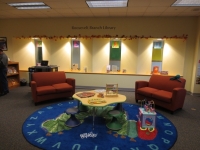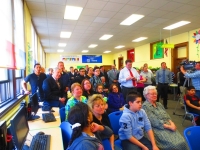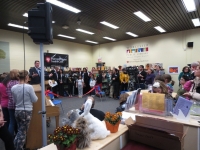One City, One Library
Worcester Public Library, Mass.
Innovation Synopsis
Worcester Public Library created an initiative that leveraged public and private resources to assist students, educators, customers, and residents in equitably accessing literature, information, and technology. WPL partnered with Worcester Public Schools to establish Young Minds Libraries in four elementary schools providing full-service public library offerings.
Challenge/Opportunity
In the city of Worcester, 59% of public school students are failing to read proficiently by the end of third grade, putting them at significant risk of dropping out of school at some point. With the addition of full-service public library offerings in each of the four elementary schools, the WPL is working towards improving K-6 reading skills. For this submission, we introduce you to the Goddard School of Science and Technology, which has great need. Goddard is on the cusp of becoming a Level 4 school, which means that the school’s students are scoring well below grade level and lag behind state and city peers. 87% of Goddard students are failing to reach the benchmark for reading proficiency by the end of third grade. Other noteworthy Goddard figures include:
- 64.2% of students do not speak English as their first language
- 60.4% of the students have limited English proficiency
- 94.6% of the students are low-income
- 97.8% are identified as high need students
We know it takes a village to change these statistics and we believe the One City, One Library project is a step in a very positive direction with a very simple goal: “To ensure students have access to age-appropriate reading materials and technology and give them the professional support that they need to learn critically important life-skills.”
Key Elements of Innovation
Past reductions in funding forced the closure of elementary school libraries and all but two public branch libraries in the city of Worcester. To address urban literacy challenges and maximize the use of school building assets year-round, the One City, One Library initiative was created. Four of 33 elementary schools were selected based on a variety of factors including literacy levels, socio-economic demographics, existing floor plan space, and the feasibility of building a branch that the general public could easily access. We raised funds for a Bookmobile to serve those elementary schools that were not selected for the initial pilot project. A noteworthy aspect of our initiative is that the public library serves students and educators during the school day, and is open to the community after school, on weekends, and during the summer. These new spaces include refurbished interior work such as new lighting, accessible entryways, and additional security features. The three operating branches have approximately 25,000 new books, state-of-the-art technology that includes touch-screen computers, eLearning tablets, electronic literacy stations, multilingual resources, and a total of 75 Ipads for students and educators to use during the day. Critical process steps included, but were not limited to, selecting high potential elementary schools across the four district quadrants, defining separate entrances for the general public, providing restroom access, insuring ADA compliance, researching a print collection that provides curriculum support, and ensuring programming space for children and teens. The WPL hired eight full time Young Minds librarians and library staff to work across the four One City, One Library locations.
Achieved Outcomes
The WPL expects this initiative will help to improve literacy skills, increase standardized test scores, and foster a love of learning and sense of community in underserved areas.
Partnering with the Worcester Public Schools Measurements Department, we are collecting data from three areas to assess our impact on literacy:
- A cohort study that compares the test results of students in a literacy program with results of students who do not have a public library in their schools. District measurements will match pilot schools with schools of similar demographics. With parental permission, student names, dates of birth, and parents' names can be used to link records with test results. In addition to accessing each student's test scores blind, we will note race, gender, primary language, and number of years in the city schools.
- Library data including the number of items circulated, customer visits, library cards issued, and program attendees. During the first four months of operation, the three existing branches (the fourth is beginning construction) circulated a total of 22,024 items, assisted 32,227 customers, issued 791 WPL cards, and hosted 1,544 individuals in 98 programs.
- Survey Monkey data that will help us assess whether or not the books were actually read. These surveys will be conducted by volunteers using the iPads. We received private funding for a measurement study by an outside consulting firm.
We believe that these efforts will give our youth, the future of our city, the opportunity to become the best and brightest.



